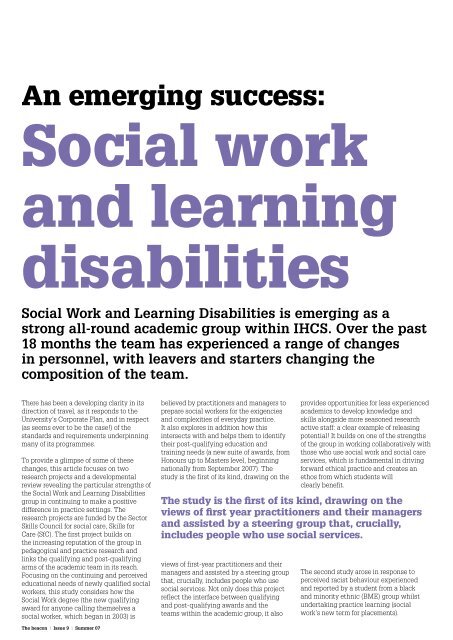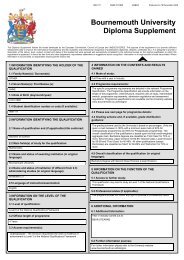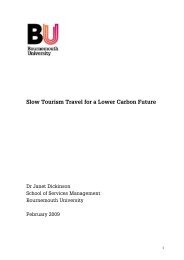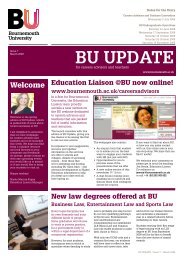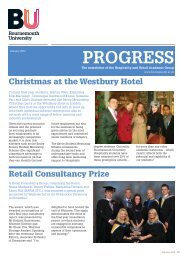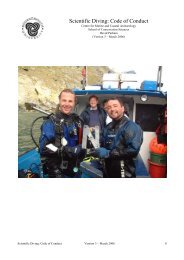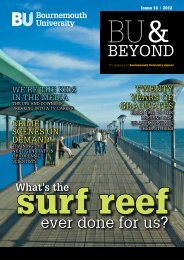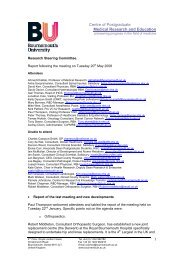Issue 9 (PDF 1.26 mb) - Bournemouth University
Issue 9 (PDF 1.26 mb) - Bournemouth University
Issue 9 (PDF 1.26 mb) - Bournemouth University
You also want an ePaper? Increase the reach of your titles
YUMPU automatically turns print PDFs into web optimized ePapers that Google loves.
An emerging success:<br />
Social work<br />
and learning<br />
disabilities<br />
Social Work and Learning Disabilities is emerging as a<br />
strong all-round academic group within IHCS. Over the past<br />
18 months the team has experienced a range of changes<br />
in personnel, with leavers and starters changing the<br />
composition of the team.<br />
There has been a developing clarity in its<br />
direction of travel, as it responds to the<br />
<strong>University</strong>’s Corporate Plan, and in respect<br />
(as seems ever to be the case!) of the<br />
standards and requirements underpinning<br />
many of its programmes.<br />
To provide a glimpse of some of these<br />
changes, this article focuses on two<br />
research projects and a developmental<br />
review revealing the particular strengths of<br />
the Social Work and Learning Disabilities<br />
group in continuing to make a positive<br />
difference in practice settings. The<br />
research projects are funded by the Sector<br />
Skills Council for social care, Skills for<br />
Care (SfC). The first project builds on<br />
the increasing reputation of the group in<br />
pedagogical and practice research and<br />
links the qualifying and post-qualifying<br />
arms of the academic team in its reach.<br />
Focusing on the continuing and perceived<br />
educational needs of newly qualified social<br />
workers, this study considers how the<br />
Social Work degree (the new qualifying<br />
award for anyone calling themselves a<br />
social worker, which began in 2003) is<br />
The beacon l <strong>Issue</strong> 9 l Summer 07<br />
believed by practitioners and managers to<br />
prepare social workers for the exigencies<br />
and complexities of everyday practice.<br />
It also explores in addition how this<br />
intersects with and helps them to identify<br />
their post-qualifying education and<br />
training needs (a new suite of awards, from<br />
Honours up to Masters level, beginning<br />
nationally from Septe<strong>mb</strong>er 2007). The<br />
study is the first of its kind, drawing on the<br />
provides opportunities for less experienced<br />
academics to develop knowledge and<br />
skills alongside more seasoned research<br />
active staff: a clear example of releasing<br />
potential! It builds on one of the strengths<br />
of the group in working collaboratively with<br />
those who use social work and social care<br />
services, which is fundamental in driving<br />
forward ethical practice and creates an<br />
ethos from which students will<br />
clearly benefit.<br />
The study is the first of its kind, drawing on the<br />
views of first year practitioners and their managers<br />
and assisted by a steering group that, crucially,<br />
includes people who use social services.<br />
views of first-year practitioners and their<br />
managers and assisted by a steering group<br />
that, crucially, includes people who use<br />
social services. Not only does this project<br />
reflect the interface between qualifying<br />
and post-qualifying awards and the<br />
teams within the academic group, it also<br />
The second study arose in response to<br />
perceived racist behaviour experienced<br />
and reported by a student from a black<br />
and minority ethnic (BME) group whilst<br />
undertaking practice learning (social<br />
work’s new term for placements).


